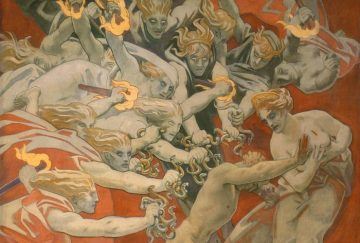Martha C. Nussbaum in the Boston Review:
 It is the end of the Trojan War. Hecuba, the noble queen of Troy, has endured many losses: her husband, her children, her fatherland, destroyed by fire. And yet she remains an admirable person—loving, capable of trust and friendship, combining autonomous action with extensive concern for others. But then she suffers a betrayal that cuts deep, traumatizing her entire personality. A close friend, Polymestor, to whom she has entrusted the care of her last remaining child, murders the child for money. That is the central event in Euripides’s Hecuba (424 BCE), an anomalous version of the Trojan war story, shocking in its moral ugliness, and yet one of the most insightful dramas in the tragic canon.
It is the end of the Trojan War. Hecuba, the noble queen of Troy, has endured many losses: her husband, her children, her fatherland, destroyed by fire. And yet she remains an admirable person—loving, capable of trust and friendship, combining autonomous action with extensive concern for others. But then she suffers a betrayal that cuts deep, traumatizing her entire personality. A close friend, Polymestor, to whom she has entrusted the care of her last remaining child, murders the child for money. That is the central event in Euripides’s Hecuba (424 BCE), an anomalous version of the Trojan war story, shocking in its moral ugliness, and yet one of the most insightful dramas in the tragic canon.
From the moment Hecuba learns of Polymestor’s betrayal, she is a different person. Unable to repose any trust in anyone, unwilling to be persuaded, she becomes utterly solipsistic and dedicates herself entirely to revenge. She murders Polymestor’s children and puts out his eyes—symbolizing, it would seem, the total extinction of their relationship of mutuality and care, as well as her own refusal of friendly reciprocal vision. Polymestor wanders onstage blind, crawling on all fours like the beast he always was. At the end of the play, it is prophesied that Hecuba will be transformed into a dog—an animal the Greeks (wrongly) associated with rabid pursuit of prey and a total lack of interpersonal concern. As Dante summarizes her story in the Inferno, “deranged, she barked like a dog: so far had anguish twisted her mind.”
More here.
